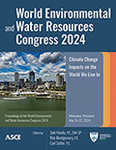Sociotechnical Transitions in Water Systems: Applying the Multi-Level Perspective to Characterize the Transition from Centralized to Dual System Water Supply
Publication: World Environmental and Water Resources Congress 2024
ABSTRACT
Centralized urban water supply systems affect high social, economic, and environmental costs through large-scale treatment and distribution of potable water for all end uses. This technological regime is being challenged by climate change, population growth, and aging infrastructure. One sustainable practice is the reuse of wastewater for non-potable end uses through a dual water reticulation system. There are few large-scale implementations of dual systems in the US, and proactive adoption of dual systems is rare. This is because water infrastructure, as a sociotechnical system, exists in a three-dimensional landscape of technology, society, and institutions. The transition from a centralized water management paradigm to a decentralized, fit-for-purpose regime is a major transformation which involves not only technological changes, but also changes in the momentum of behaviors, regulations, infrastructure, and symbolic meaning. This research applies the multi-level perspective (MLP), which is a leading theory in the field of sustainable transitions, to characterize the transition from a centralized water system to a dual water system. The MLP is applied to characterize landscape pressures by calculating changes in four standardized exposure metrics: water stress, public attention to water supply issues, financial stress, and policy developments. Time series of the four exposure metrics are synthesized to explore periods of accelerated change (PoACs) when data show increasing public attention, higher water stress, and multiple new water-related policies. In 2001, the Town of Cary became the first water utility in North Carolina to utilize a secondary water reticulation network for providing reclaimed water to households and businesses. This research applies the MLP to characterize landscape pressures in the context of water stress and public attention to the Town of Cary dual system. The MLP provides a description and explanation of the effects of landscape changes on consumer support for reclaimed water reuse.
Get full access to this chapter
View all available purchase options and get full access to this chapter.
REFERENCES
Brown, R. R., Farrelly, M., and Loorbach, D. (2013). Actors working the institutions in sustainability transitions: The case of Melbourne’s stormwater management. Global Environmental Change, 23(4), 701–718. https://doi.org/10.1016/j.gloenvcha.2013.02.013.
Fisher, R., and Tripp, S. (n.d.). Reuse for Managing Water Demand and Wastewater Discharge: Cary’s Reclamation Program. Available at https://p2infohouse.org/ref/12/11445.pdf. Accessed December 12, 2023.
Garcia, M., Koebele, E. A., Deslatte, A., Ernst, K., Manago, K. F., and Treuer, G. (2019). Towards urban water sustainability: Analyzing management transitions in Miami, Las Vegas, and Los Angeles. Global Environmental Change, 58, 101967. https://doi.org/10.1016/j.gloenvcha.2019.101967.
Geels, F. W. (2002). Technological transitions as evolutionary reconfiguration processes: a multi-level perspective and a case-study. Research Policy, 31(8–9), 1257–1274. https://doi.org/10.1016/s0048-7333(02)00062-8.
Geels, F. W. (2005). Processes and patterns in transitions and system innovations: Refining the co-evolutionary multi-level perspective. Technological Forecasting and Social Change, 72(6), 681–696. https://doi.org/10.1016/j.techfore.2004.08.014.
Geels, F. W. (2006). Multi-Level Perspective on System Innovation: Relevance for Industrial transformation. In Kluwer Academic Publishers eBooks (pp. 163–186). https://doi.org/10.1007/1-4020-4418-6_9.
Geels, F. W., and Schot, J. J. (2007). Typology of sociotechnical transition pathways. Research Policy, 36(3), 399–417. https://doi.org/10.1016/j.respol.2007.01.003.
Gleick, P. H. (2003). Global Freshwater Resources: Soft-Path Solutions for the 21st Century. Science, 302(5650), 1524–1528. https://doi.org/10.1126/science.1089967.
Haxeltine, A., Whitmarsh, L., Bergman, N., Rotmans, J., Schilperoord, M., and Köhler, J. (2008). A Conceptual Framework for transition modelling. International Journal of Innovation and Sustainable Development, 3(1/2), 93. https://doi.org/10.1504/ijisd.2008.018195.
Hughes, S., Pincetl, S., and Boone, C. G. (2013). Triple exposure: Regulatory, climatic, and political drivers of water management changes in the city of Los Angeles. Cities, 32, 51–59. https://doi.org/10.1016/j.cities.2013.02.007.
Köhler, J., Whitmarsh, L., Nykvist, B., Schilperoord, M., Bergman, N., and Haxeltine, A. (2009). A transitions model for sustainable mobility. Ecological Economics, 68(12), 2985–2995. https://doi.org/10.1016/j.ecolecon.2009.06.027.
Mauw, T., Smith, S. R., and Torrens, J. (2022). Sustainability transitions in Los Angeles’ water system: the ambivalent role of incumbents in urban experimentation. Journal of Environmental Policy & Planning, 25(4), 368–385. https://doi.org/10.1080/1523908x.2022.2156487.
North Carolina Department of Environmental Quality. (2023). Jordan Lake Water Supply Storage Allocation Recommendations. Available at https://www.deq.nc.gov/about/divisions/water-resources/planning/basin-planning/map-page/cape-fear-river-basin-landing/jordan-lake-water-supply-allocation. Accessed December 12, 2023.
Oelkers, E. H., Hering, J. G., and Zhu, C. (2011). Water: Is there a global crisis? Elements, 7(3), 157–162. https://doi.org/10.2113/gselements.7.3.157.
Padowski, J., and Gorelick, S. M. (2014). Global analysis of urban surface water supply vulnerability. Environmental Research Letters, 9(10), 104004. https://doi.org/10.1088/1748-9326/9/10/104004.
Rip, A., and Kemp, R. (1998). Technological change. Rayner, S., Malone, E.L. (Eds), Human Choice and Climate Change, Vol. 2. Battelle Press, Columbus, OH, pp. 327–399.
Rogers, P., and Grigg, N. S. (2014). Trends in dual water systems. Journal of Water Reuse and Desalination, 5(2), 132–141. https://doi.org/10.2166/wrd.2014.021.
Technological change. (1977). American Journal of Agricultural Economics, 59(2), 426. https://doi.org/10.1093/ajae/59.2.426-a.
Town of Cary. “Long range water resources plan,” 2023. [Online]. Available: https://www.carync.gov/services-publications/plans-publications-reports/longrange-water-resources-plan. [Accessed 2023].
Treuer, G., Koebele, E. A., Deslatte, A., Ernst, K., Garcia, M., and Manago, K. F. (2017). A narrative method for analyzing transitions in urban water management: The case of the Miami-Dade Water and Sewer Department. Water Resources Research, 53(1), 891–908. https://doi.org/10.1002/2016wr019658.
Turnheim, B., Berkhout, F., Geels, F. W., Hof, A. F., McMeekin, A., Nykvist, B., and Van Vuuren, D. (2015). Evaluating sustainability transitions pathways: Bridging analytical approaches to address governance challenges. Global Environmental Change, 35, 239–253. https://doi.org/10.1016/j.gloenvcha.2015.08.010.
United Nations. (2012). World Urbanization Prospects: The 2011 Revision. United Nations Publications.
Information & Authors
Information
Published In
History
Published online: May 16, 2024
ASCE Technical Topics:
- Business management
- Ecosystems
- Environmental engineering
- Infrastructure
- Landscaping
- Practice and Profession
- Social factors
- Urban and regional development
- Urban areas
- Wastewater management
- Water and water resources
- Water management
- Water policy
- Water reclamation
- Water supply
- Water supply systems
- Water treatment
- Water use
Authors
Metrics & Citations
Metrics
Citations
Download citation
If you have the appropriate software installed, you can download article citation data to the citation manager of your choice. Simply select your manager software from the list below and click Download.
